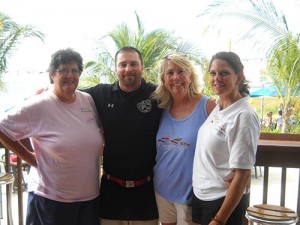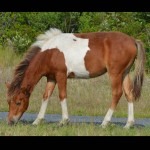
ASSATEAGUE — The latest addition to the fold of Assateague’s famed wild horse has been named in honor of a resort business owner after a raffle winner opted to recognize the long-time volunteer on the barrier island.
Just before Christmas last December, a pinto filly was born on Assateague, becoming the newest addition to the barrier island’s most famed residents. Throughout the late summer, the Assateague Island Alliance (AIA), the friends group for the Assateague Island National Seashore, sold raffle tickets for the naming rights to the new filly and the drawing was held last week at Macky’s Bayside Bar and Grill.
The winning raffle ticket was drawn at random by Macky’s employee Justin McIntyre, who promptly named the new foal “Ms. Macky” in honor of restaurant owner Pam Stansell, a long-time volunteer for the AIA and the Assateague Island National Seashore. For years, Stansell has served as a Pony Patrol volunteer, educating visitors on the rules and regulations in place to keep both the horses and their human counterparts on the island safe. “Ms. Macky” is the newest addition to the AIA’s Foster Horse Program and will soon be available for adoption.
Prior to the raffle last week, the new foal was known only as N2BHS-AL. In the mid-1970s, the National Park Service began naming new foals in the Assateague herd
with an alpha-numeric code to help track the lineage and ancestry of the wild horses and identify to which sub-herd they belong and which areas of the island they frequent. For example, “Ms. Macky” was birthed by N2BHS-A, more commonly known now as “Gokey Go Bones.” Although Gokey Go Bones was often seen with N2BHSX, or Jester, while she was pregnant, the coloring of the new foal suggests the sire was likely N9BM-E, or Yankee.
The birth of the new foal in December was a pleasant pre-holiday surprise for Assateague Island National Seashore staffers, largely because they did not know Gokey Go Bones was even pregnant. Assateague officials regularly collect the horse’s feces and test for hormones that reveal if any of the horses are pregnant, similar to a human pregnancy test. However, because the mares carry the foals for 11 and a half months, Gokey Go Bones may not have been showing any hormone changes when her feces was tested.
The goal brought the island’s native horse population to 101, which is close to the ideal range of 80 to 100. It was the second foal born in 2013, the first coming last May. With just two foals birthed last year, the number came in lower than the statistical average. While three to five foals are born in a typical year, an in-kind number drop off due to old age, illness or other natural or manmade factors. The mortality rate is around three to five per year, which coincides with the typical birth rate.
In the interest of managing the size of the herd, which, if left unchecked would overtake the barrier island and gobble up the very resources the wild ponies need to survive, the National Park Service several years ago began a contraceptive program for the mares in the herd. The mares are injected with a non-invasive contraceptive to prevent multiple births in an effort to maintain and ultimately shrink the size of the herd to its manageable threshold. In the interest of maintaining the gene pool of the famous wild ponies, believed to be descendants of domesticated horses placed on the island 300 years ago, each mare is allowed to birth one foal before being put on the contraceptive program.

